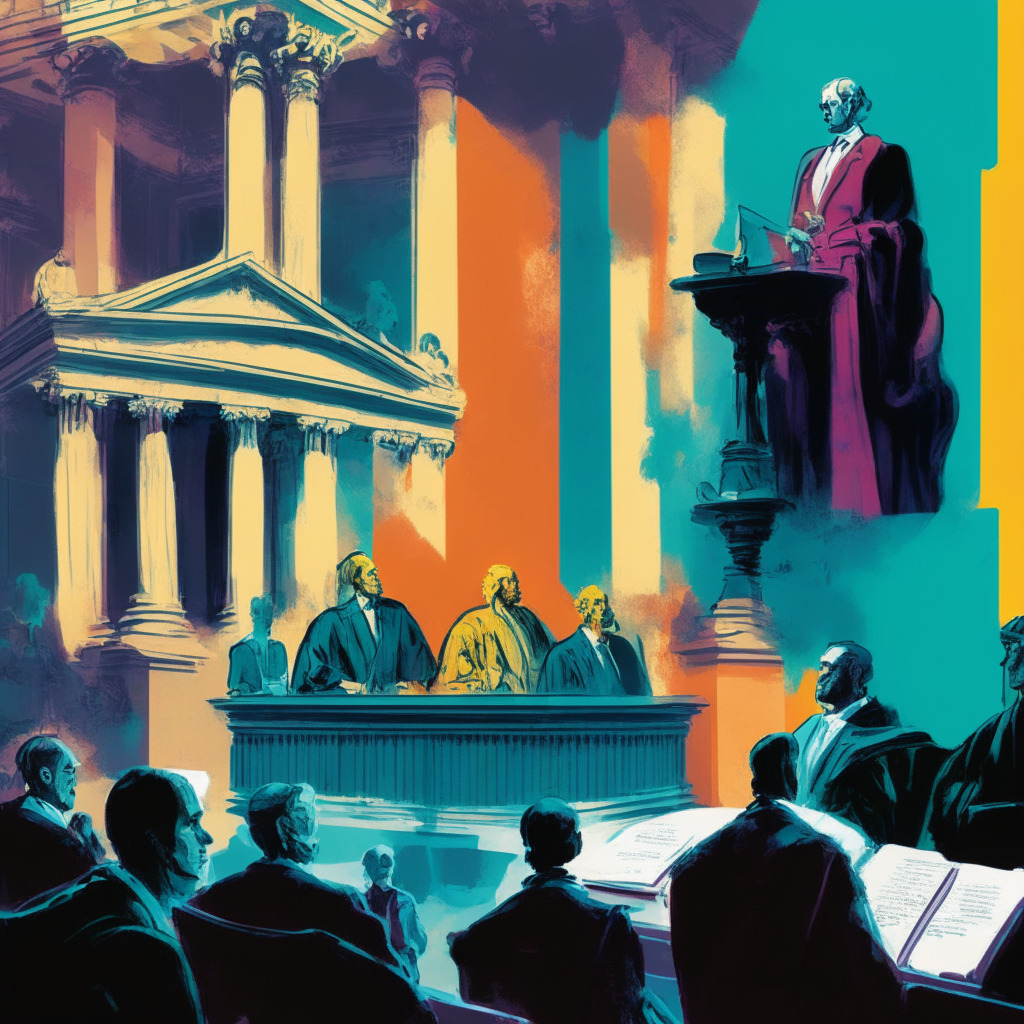“The recent court ruling overruling the SEC’s decision to deny Grayscale’s Bitcoin trust to become a spot ETF could potentially bring crypto into line. Approval of spot Bitcoin ETFs could introduce consistent regulatory standards, promote market equilibrium and offer investor protections, without undermining securities law enforcement.”
Search Results for: Commodity Futures Trading Commission
Navigating Regulatory Hurdles: CFTC Member Advocates for Cryptocurrency Pilot Program
CFTC’s Caroline Pham advocates for a pilot program to oversee cryptocurrencies, aiming to stimulate the growth of digital asset markets. Besides facing resistance from current CFTC leadership, the crypto industry’s future is uncertain due to regulatory skepticism and Congress bills’ fate.
The Fall of Celsius: A Cautionary Tale of Blockchain Revolution and Its Risks
“Alex Mashinsky, ex-CEO of the defunct crypto lender, Celsius, faces federal court restrictions due to fraud allegations, including overselling Celsius’ financial health and indulging in risky trading practices. Legal action includes civil lawsuits and a potential $4.7 billion fine. The Celsius saga exemplifies the potential risks and rewards of the blockchain revolution.”
Evaluate Onchain Summer’s Impact and Jefferson’s Appointment on Crypto Market Future
‘Onchain Summer,’ an event promoting Base, Ethereum’s layer-2, saw 700,000 NFTs minted by over 268,000 users. Over $242 million in crypto assets were transferred to Base whilst facing challenges like network outages and scams. Philip Jefferson’s appointment as Federal Reserve vice chair signals potential advancements and uncertainties for the crypto sector.
Navigating the Blockchain Future: The Impact of Federal Leadership Changes on Crypto Regulation
“The leadership at institutions like the Federal Reserve significantly influence policy changes, specifically cryptocurrency and blockchain regulation. While the US Federal Reserve reportedly has no plans for a digital dollar, the recent changes in leadership may significantly impact future policy. As cryptocurrencies and blockchain technology reshape financial systems, the balance between innovation and regulation remains a focus.”
High-Profile Departure from Binance: Tracing the Ripple Effect in the Blockchain Cosmos
Leon Foong, former head of Binance Asia-Pacific, is reportedly leaving the leading cryptocurrency exchange amidst its burgeoning expansion and regulatory challenges. Despite such high-profile departures, Binance CEO Changpeng Zhao actively advances towards his 200M-user goal in Asia-Pacific, undeterred by the regulatory struggles. Binance’s future, thus, remains an exciting puzzle wrapped in uncertainty.
Crypto Commodities: Bitcoin and Ether and their Legal Status in US Courts
U.S. District Court Judge Katherine Polk Failla recently referred to Ether and Bitcoin as “crypto commodities,” dismissing a lawsuit against decentralized exchange Uniswap. The legal classifications of cryptocurrencies continue to vary, with other digital currencies such as XRP classified as a security. Amidst conflicting views, U.S. lawmakers are yet to determine whether SEC or the CFTC will have authority over digital assets. Specialists suggest these legal classifications are crucial for creating a more organized and regulated crypto environment.
Grayscale’s Victory Stirs Up Controversy: Doubts Over SEC’s Gensler Heighten
“Cryptocurrency circles discuss Grayscale’s lawsuit and SEC chair Gary Gensler’s role. Congressman Warren Davidson suggests Gensler’s SEC decisions lack stead, as demonstrated by Grayscale’s legal victory. This opens up possibilities for a Bitcoin spot ETF emergence in the US, but the situation remains uncertain.”
Shackles or Safeguards? Federal Reserve’s Crypto Oversight Fuels Global Expansion
The Federal Reserve’s intensified scrutiny of banks’ cryptocurrency activities has sparked criticism from Republican lawmakers who argue this deters institutions from participating in the digital asset landscape. The Fed’s new requirements may potentially suppress the progress of decentralized finance. Amidst this, U.S. regulations on digital assets remain unclear, pushing some crypto companies to explore alternative markets overseas. The discourse focuses on balancing effective supervision with fostering blockchain innovation.
The Great Debate: U.S. Crypto Development Hiatus or Reinvention?
Antonio Juliano, founder of dYdX, suggests a hiatus for US-focused crypto development due to the austere regulatory framework. He encourages startups to explore non-US markets for less regulatory ambiguity and swifter growth. However, the CEO of Coinbase, Brian Armstrong, is confident in US adaptability, contradicting Juliano’s decade-long pause suggestion.
Navigating U.S. Crypto Regulations: Retreat or Stand Ground for Long-Term Survival?
Antonio Juliano, founder of dYdX, suggests crypto developers should shift their focus from the convoluted U.S. regulatory environment to friendlier overseas markets for the next five to ten years. His perspective sheds light on the industry perception that U.S. lacks definitive digital asset regulations. However, views differ, with some believing that despite current regulatory obscurity, pioneers can seek clarity and establish a safe, legal operating ground in the U.S.
Visa and Mastercard Sever Ties with Binance: A Shake-up or Just a Ripple in the Crypto Market?
“Payment giants Visa and Mastercard have distanced themselves from Binance amid ongoing regulatory challenges for the leading crypto exchange. Despite this, industry experts predict modest impact on Binance’s market share. The situation illustrates how institutional caution could affect the cryptocurrency market’s future.”
Tether’s Stablecoin Reign: Surmounting Regulatory Scrutiny, Market Competition, and Financial Accusations
“Tether’s market capitalization stands at $86.1 billion, with total assets exceeding liabilities, signifying stability and dominance over its competitors. Despite facing regulatory scrutiny and skepticism, Tether remains popular among investors due to its transparency and surplus reserves.”
Unveiling Tether’s Billion Dollar Liquidity Cushion Amidst Crypto Security Concerns
“Tether maintains a $3.3 billion liquidity cushion across 15 blockchain ecosystems, bolstering its stablecoin ecosystem. However, concerns about the currency’s liquidity and asset backing persist. Other Tether stablecoins lack the same liquidity cushion, failing to sustain the 1-1 peg in crisis times.”
Mastercard Ends Crypto Card Partnership with Binance: An Insight into Evolving Crypto Regulations
Mastercard has announced the termination of its cryptocurrency card partnership with Binance amid increased regulatory scrutiny of the cryptocurrency exchange. This decision, however, does not affect Mastercard’s other crypto card partnerships and highlights the evolving landscape of crypto regulations.
Navigating the Regulatory Jungle: Unraveling US Cryptocurrency Rules and Impacts on Market Dynamics
CoinRoutes CEO Dave Weisberger discusses the complexity of cryptocurrency regulation in the United States, criticizing the use of outdated structures for new technologies. He argues for a requisite evolution of regulatory approach, without stifling innovation, warning of the potential loss of American competitiveness in the rapidly expanding crypto industry.
Bitstamp Halts Ethereum Staking for US Clients Amid Regulatory Uncertainty
“Bitstamp has ended its Ethereum staking service for US clients due to increasing regulatory ambiguity. As the SEC struggles to clearly define cryptocurrency statuses, are caught in legal battles with Binance and Coinbase. Ethereum’s classification (as a commodity or security) remains a matter of debate revealing need for transparent regulation.”
Regulatory Compliance and Crypto Exchange: Binance, Checkout.com, and the Premature Contract Termination
“Binance, the world’s largest cryptocurrency exchange, faced contract termination from payment processing giant Checkout.com due to regulatory concerns. Checkout had facilitated billions in crypto transactions for Binance. This termination underscores the impact of regulatory scrutiny on even the most lucrative partnerships within the crypto industry.”
Binance Connect’s Shutdown: Reflection on Regulatory Challenges in Crypto’s Growth Journey
“Binance Connect, a regulated crypto trading platform, is shutting down due to their provider discontinuing card payment service. Despite significant adaptation strategies and growth to a broad blockchain ecosystem, Binance faces ongoing regulatory complexities and issues, indicating an intricate, evolving landscape for crypto businesses.”
Between a Rock and a Hard Place: The Unclear Crypto Regulation Battlefield in the US
“Cody Carbone, VP of Policy at the Chamber of Digital Commerce, criticizes the SEC’s approach to the crypto industry as ‘unconstitutionally aggressive’, adding ambiguity and threatening constitutional values. The undecided jurisdiction of digital asset regulation adds to the industry’s risk. The SEC’s alleged attempts to control crypto without proper legislation is a major concern.”
U.S Crypto Regulation: Balancing Innovation, Market Expansion and Legislative Oversight
Grayscale’s CEO expresses concerns about U.S. regulations potentially hindering innovation in the crypto sector. Hopes lie on recent legislation effort from Congress for clearer rules. However, concerns over the SEC’s ambiguous methodology for Bitcoin ETFs approval persist, questioning the sustainability of such products in the changing market.
Fundsz Busted: Cryptocurrency Fraudsters and the Need for Vigilant Regulation
“The exchange Fundsz and associated individuals were recently accused by the CFTC of fraudulent cryptocurrency trading, misleading over 14,000 individuals with exaggerated return projections. The CFTC alleged Fundsz’s entire business model was built upon fabricated profits, never actually trading with customer funds.”
Redefining Boundaries: SEC, Coinbase Lawsuit, and the Call for Crypto Regulation Reformation
U.S. Senator Cynthia Lummis and crypto experts assert that the SEC’s examination of crypto trading platforms, like Coinbase, as unregistered securities exceeds their jurisdiction. The SEC’s authority question, they believe, should rest with Congress. Much debate exists around immediacy and breadth of crypto regulation, with an emphasis on establishing comprehensive, globally mindful approaches to build trust in the market.
U.S. Justice Department vs Binance: Predicting Ripple Effects on Bitcoin Prices in the Face of Scandal
“The U.S. Department of Justice is considering fraud charges against Binance, potentially impacting the crypto market. Regardless of the outcome, experts suggest the market, due to its resilience and increasing utility, could weather the storm. However, possible Binance asset drain could trigger a market crash, while the outcome could affect Bitcoin’s value trajectory by year-end.”
US District Court Rules in Favor of Tether: A Closer Look at Stablecoin Regulatory Overhaul
The U.S. District Court dismissed a lawsuit against Tether and Bitfinex, rejecting allegations of false assurances about Tether’s stablecoin, USDT, being fully backed by the US dollar. Despite controversies, Tether remains a dominant player in the stablecoin market, owning a 66.7% market share.
Revolut Halts Crypto Services in US: A Response to Regulatory Uncertainties or a Blow to Crypto Advancement?
The British digital bank, Revolut, has ceased its cryptocurrency services for US customers due to shifting US regulations and market uncertainties. As crypto companies grapple with regulatory clampdowns and accusations of regulatory violations, it becomes challenging to maintain services for American clients. Despite setbacks, crypto-friendly banking services may return to the US market in future.
Navigating Rough Waters: Binance’s New Compliance Leadership Amid Regulatory Challenges
“Binance announced that Kristen Hecht assumed the role of Deputy Chief Compliance Officer amidst potential fraud charges. Her responsibilities include strengthening compliance provisions, combating financial crime risks and overseeing anti-money laundering teams. This occurs as Binance navigates through regulatory scrutiny in the US and Europe.”
Binance Bolsters Defense with New Deputy Chief Amid Mounting Regulatory Scrutiny
Binance, the renowned cryptocurrency exchange, has appointed Kristen Hecht as its new Deputy Chief Compliance and Global Money Laundering Reporting Officer amid potential fraud charges from US regulators. Hecht will monitor key areas while managing company’s compliance program and liaising with regulators and industry bodies.
Binance Facing Fraud Charges: Potential Ripple Effects on Crypto Industry
Popular crypto exchange Binance could potentially face fraud charges by the U.S. Department of Justice, according to CoinDesk. Legal alternatives such as fines and deferred or non-prosecution agreements are being considered due to potential industry-wide implications.
Navigating the Regulatory Tightrope: A Closer Look at Potential Charges against Binance
“The Justice Department mulls charging Binance with fraud, raising concerns about consumer impact and future regularity measures. While legal accountability for crypto exchanges promotes market trust, over-regulation might stifle innovation, presenting a delicate balance for the future of the crypto industry.”
Binance Under Regulatory Siege: An Examination of Crypto Market Challenges and Future Solutions
“Binance, a top cryptocurrency platform, may be closing its US-based arm amidst regulatory pressures. CEO Brian Shroder opposes the shutdown due to its impact on exchange users. Meanwhile, Binance is expanding globally, emphasizing diversification and compliance with local regulations.]”
Binance’s Potential U.S. Exit: A Catalyst for Crypto Regulatory Clarity?
“Binance, the crypto exchange platform, is considering shutting its US operations amid intensified regulatory scrutiny and allegations of operating as an unregistered securities exchange. This decision is potentially significant for future crypto adoption, regulatory compliance, and the ongoing institutionalization of cryptocurrencies.”































